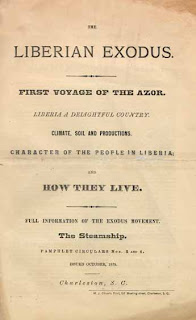AAHGS 2010 & The Bark Azor
It’s been three weeks since I attended the AAHGS conference, and I'm still thinking about it, processing all that I learned. It was my first time and I was just blown away by the incredible work being done! While I went to try to identify new sources to mine or to get more out of the sources I have, sometimes I just got caught up with other people’s experiences.
That's what happened the first day at the first session I went to. Anna Guy Burroughs presented research she had done on the experiences of one of her husband’s ancestors. The story, according to the family’s oral history, was that a relative in freedom had gone back to Africa. Anna found plenty of information from the antebellum and post-war efforts of the American Colonization Society to Marcus Garvey’s Back to Africa movement but still hadn’t found what she was looking for.
She shared a story about how she was book shopping and already had an armful of books that would keep her busy when she came across a book that caught her attention. She picked it up, thought about it but then put it back. She said she was drawn back to it and said that sometimes that happens when something else is at work, something powerful like the ancestors, she suggested. Her audience agreed, knowing how some events and discoveries seem to be guided by those who want their stories to be told.
Anna left the book again, but once more was pulled back to it. She decided to buy it. She read it and was halfway through when she came across a single reference to led her to the Liberian Exodus Association, a ship called the Bark Azor -- and her husband's ancestors who had gone to Africa in 1878!
Anna's presentation "The Bark Azor and Liberian Exodus-Beyond the American Colonization Society" gave me chills. It was another incredible part of American history that I never learned in school, not even in college courses in African American history -- the accounts of free people experiencing the failure of Reconstruction and unbearable oppression and deciding to go to Africa. I had seen an episode of the History Detectives that mentioned "informal networks that people tried to use to raise funds to get to Africa," but it was the first time I got to hear details of how this was actually done.
Fortunately for Anna and for all of us, the Liberian Exodus Association and the Bark Azor are well documented and a lot information is accessible online. Anna's presentation was exciting, inspiring and well-sourced -- a perfect way to start the conference!
That's what happened the first day at the first session I went to. Anna Guy Burroughs presented research she had done on the experiences of one of her husband’s ancestors. The story, according to the family’s oral history, was that a relative in freedom had gone back to Africa. Anna found plenty of information from the antebellum and post-war efforts of the American Colonization Society to Marcus Garvey’s Back to Africa movement but still hadn’t found what she was looking for.
She shared a story about how she was book shopping and already had an armful of books that would keep her busy when she came across a book that caught her attention. She picked it up, thought about it but then put it back. She said she was drawn back to it and said that sometimes that happens when something else is at work, something powerful like the ancestors, she suggested. Her audience agreed, knowing how some events and discoveries seem to be guided by those who want their stories to be told.
Anna left the book again, but once more was pulled back to it. She decided to buy it. She read it and was halfway through when she came across a single reference to led her to the Liberian Exodus Association, a ship called the Bark Azor -- and her husband's ancestors who had gone to Africa in 1878!
Anna's presentation "The Bark Azor and Liberian Exodus-Beyond the American Colonization Society" gave me chills. It was another incredible part of American history that I never learned in school, not even in college courses in African American history -- the accounts of free people experiencing the failure of Reconstruction and unbearable oppression and deciding to go to Africa. I had seen an episode of the History Detectives that mentioned "informal networks that people tried to use to raise funds to get to Africa," but it was the first time I got to hear details of how this was actually done.
Fortunately for Anna and for all of us, the Liberian Exodus Association and the Bark Azor are well documented and a lot information is accessible online. Anna's presentation was exciting, inspiring and well-sourced -- a perfect way to start the conference!



I had similar experience. I WAS working on a biblical studies paper..I took a.break and was walking around the African American studies part of.the Library
ReplyDelete.I noticed a book on the shelf South Carolina Negroes of 1877. MY MATERNAL.GEANDMOTHER AND FAMILY WERE FROM SouTH CAROLINA. I LOOKED IN INDEX NONE OF THEIR FAMILY NAMES.WERE LISTED.YET A NAME SPENCER REEVES WAS LISTED I SAID WHATBUS HE HERE FOR HE NOT FROM S.C. I DO NOT BELIEVE IN CO INCIDENCE. MY DAD' MATERNAL GREAT GRAND DAD WAS A SPENCER REEVES FROM MILLEDGEVILLE GEORGIA...WELL I CHECKED THE INFO AND IT WAS ABOUT.A SPENCER REEVES FROM MILLEDGEVILLE WHO.WAS.ON THE 1876 BARK.AZOR..TO.LIBERIA.AND RETURNED IN 1877.ON THE MONROVIA..NO ON I OIR FAMILY EVER KNEW THIS..MY GRAND MOTHER WAS VERY CLISE WITH HER MIMS FAMILY.AND GRAN DID.NOT KNOW THIS...